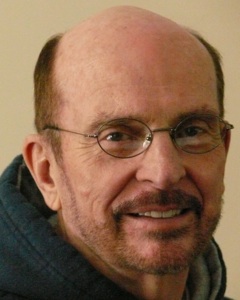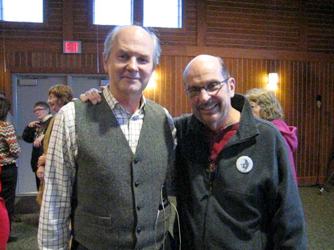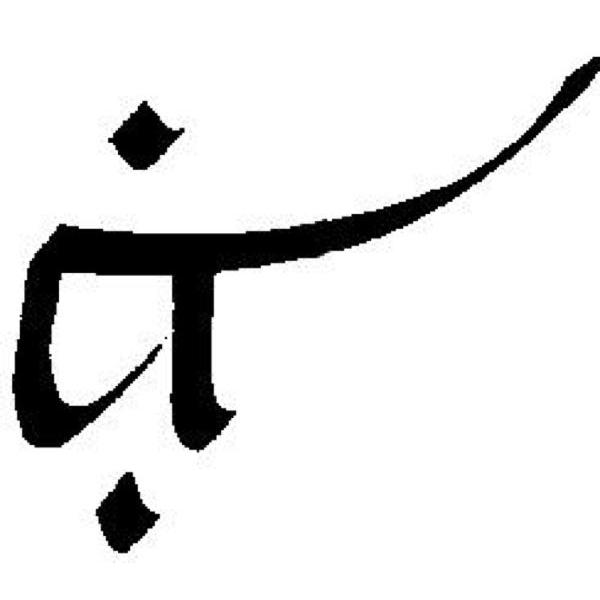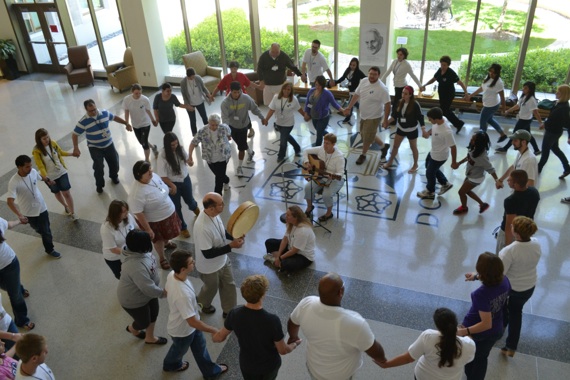By Sharon Abercrombie
(This is the second in an ongoing series of stories featuring people worldwide who are sharing Neil Douglas-Klotz’s Aramaic Jesus and Desert Wisdom-related work. Our newest profile spotlights Br. Joe Kilikevice, a Dominican friar based in Oak Park, Illinois. If you have a related experience to share with us, please contact Sharon at Nurjehan3@att.net).
Dominican Brother Joe Kilikevice has been dancing in Sufi circles since the late 1960’s.
He credits a 1965 Roman Catholic document coming out of the Second Vatican Council for setting him on the path of his life’s work. Nostra Aetate, (“In Our Time,) is a groundbreaking paper that stresses the religious bond shared by Jews and Catholics and calls for the church to dialogue with other world religions.
By 1983, Br. Joe was bringing the Dances of Universal Peace, particularly the Aramaic words of Jesus, to the art-as-meditation class he was teaching in Oakland, California.
Since then he has been leading “The Lord’s Prayer,” “The Beatitudes,” the “I Am” sayings of John and other dances created by Neil Douglas-Klotz . He has introduced them into his own Catholic tradition to Dominican high schools and colleges throughout the United States. He has brought them to interfaith groups, both in the Midwest and abroad. “I wouldn’t be here but for that document,” said Br. Joe during a recent phone interview.
“Work” is probably too thin a word to describe Br. Joe’s ministry. For those of us who have danced with Joe Kilikevice at Plano, Illinois and in other retreat settings, “passionate dedication” is more like it.
Br. Joe discovered the dances during a retreat in San Jose, California more than 40 years ago. “Let’s go Sufi dancing,”  someone suggested. A DUP North American Journal story from 2011 notes that Br. Joe hadn’t a clue as to what Sufi dancing might be, but he decided it would be a good idea to ‘get off the mountain’ for a few hours.” He piled into a crowded station wagon with the rest of his friends.
someone suggested. A DUP North American Journal story from 2011 notes that Br. Joe hadn’t a clue as to what Sufi dancing might be, but he decided it would be a good idea to ‘get off the mountain’ for a few hours.” He piled into a crowded station wagon with the rest of his friends.
The dance experience that evening touched him deeply. For the first time, this life-long Catholic and Dominican brother realized that “you don’t have to give up your own faith tradition to be enriched by the traditions of other people.”
A couple of years later, back in Chicago, he located another dance meeting. This one was fine, too, but he wished it had included more dancing and less talking.
His wish came true in 1983, when Br. Joe moved to Oakland California. Matthew Fox, a Dominican colleague had recently moved his Creation Spirituality master’s program from Mundelein College in Chicago to Holy Names College. Fox invited his old friend to resume teaching the art-as-meditation class he had previously taught at Mundelein. It didn’t take long for Br. Joe to discover the stunning smorgasbord of dance meetings throughout the Bay Area.
That’s how he met Neil-Douglas-Klotz. One Saturday morning, Joe Kilikevice found himself in San Francisco’s Precita Park with Neil and six other dancers, chanting and moving to “Abwoon d’bashmaya.” Precita Park is right across the street from Mentorgarten, the home of Murshid Samuel Lewis. Murshid brought the first Dances forward during the late 1960’s, so there has always been a lot of baraka living in that park.
Br. Joe doesn’t recall who the other dancers were that day. But Br. Joe does remember the power of the Lord’s Prayer,  transliterated by Neil into Aramaic, the language Jesus/Yeshua spoke. “We were trying out the first four lines. I was immediately struck by their sense of timelessness.” Jesus/Yeshua was there in the midst of the circle, beyond the English or Latin words this Dominican had been praying all of his life.
transliterated by Neil into Aramaic, the language Jesus/Yeshua spoke. “We were trying out the first four lines. I was immediately struck by their sense of timelessness.” Jesus/Yeshua was there in the midst of the circle, beyond the English or Latin words this Dominican had been praying all of his life.
Br. Joe immediately brought the dance back to his Holy Names classroom. In subsequent years, he would become a co-retreat leader with Neil and Kamae Miller, and would then branch out with his own interfaith retreat ministry. In 1993, he founded the Shem Center, an interfaith spirituality center located in Oak Park.
His work took another significant turn in 2000 when Dominican Sisters Pat Brady and Gina Fleming invited Br. Joe to lead dances at a high school retreat, to represent “the diversity of ways Dominicans preach. They knew of my work and thought the students would both enjoy and benefit from a contemporary way a Dominican was claiming a centuries-long tradition of praying with the body. Dominicans have always brought the body into prayer with bowing, prostrating, and processing,” said Br. Joe. Two years later, when these student conferences were expanded into Dominican college venues, Br. Joe became a regular presenter there, also, in schools coast to coast.
In 2010, the Conference organizers awarded him the Sister Pat Brady award for “extraordinary service and contributions in furthering the traditions and charism of the Dominican Order.” Sr. Pat Brady praised Br. Joe for “encouraging each of us to realize the power of dance and music as a medium of peace and harmony. Brother Joe has taught us that world understanding begins with a willing, open and accepting heart. He has truly released the Spirit in each of us.”
This writer contacted both Sisters Mary Soher, and Gina Fleming, the current organizers for the student preaching conferences to gauge reactions to Br. Joe’s work. Except for occasional liturgical dance within many Catholic liturgies and prayer services, Catholics do not ordinarily dance. But Br. Joe gets them on their feet in short order.
After a day of dancing, “it ‘s not uncommon for a student to linger a bit after my session to thank me for what they experienced,’ recalls Br. Joe. “I can tell that they have been deeply moved and often can’t find the words to say so.”
Mary Soher contributed her take on the student experiences. “Something magical happens,” said Soher, an Adrian Dominican. “He teaches them to really be in the present moment, to be in the presence of the Divine with each other. If they are carrying grief, sadness or stress, the dances provide a body-soul-mind break for them.”
Soher said she has witnessed the dances as a vehicle for helping to build bonds and strengthening community among the young people.
For Amityville Dominican Sr. Gina Fleming, Br. Joe’s dance leading has been “a deeply prayerful experience. Asking us to look into each other’s eyes has touched me deeply.” His teachings have given her a better understanding of the Muslim religion, she said.
And as for the Aramaic, “it’s a part of me now,” said Fleming. “Studying the words of Jesus in His original language, “awakens you to a different way of thinking.”

